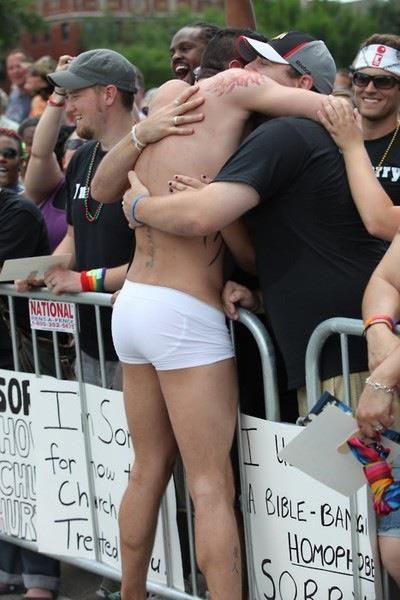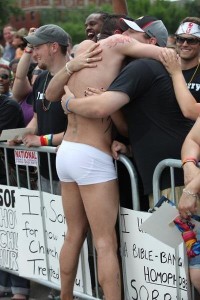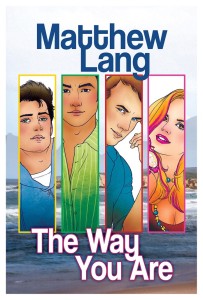Today please welcome my guest, Matthew Lang!
On Allies.
Warning. Potentially triggering.
This image was captured in 2010, at Chicago Pride. It made the rounds on the internet, and I think was 2011 before I saw it. But it’s an image that stuck with me for a long time, and it remains one of the most inspiring and wonderful images I think I’ve ever seen. Until I started writing this post I didn’t know the story behind the photo. It showed up on my social media feed and I loved it. When you come out a gay person, you’re scared. Or at least, you’re usually scared. I like to believe that there are kids out there who never had to worry about their parents’ reactions to them coming out. I live for the day that all kids who need to come out don’t have that worry. Granted there’s always the possibility that your parents may be fine with homosexual, bisexual or transgendered people in general but not their own son or daughter.
Sometimes I think being gay has made me cautious, paranoid even. On the other hand that could easily be the part where my Dad was a fairly good corporate executive that could have just made me take ‘calculated risks’. There’s always a number of different ways to look at things, and if you have a choice, I say choose the positive. And some little things, like that picture above, is a positive.
As long as being gay is something to be struggled with, the process of coming out and accepting oneself as gay is going to be fraught and there are going to be clashes with other people whether intentioned or not. It has never been a secret that publishing is an industry dominated by women. It’s also no secret that the majority of the writers and readers of fiction that celebrates men loving men are women, and I challenge anyone reading this to say that they haven’t read at least one piece of slashfiction that wasn’t as good as something you’d pay for. If you look at any of the discussions you’ll see the comment somewhere. Women can’t write about gay men. They can’t know what it’s really like for men to be in love with each other and definitely not the sex. One author I know received a comment on a book saying she didn’t have a right to write what she wrote because she knew nothing about rape and the depiction of the raped character was entirely inaccurate.
Here’s the kicker. That book was based on her own experiences. Transported into a man’s body, but her experiences.
Just because someone’s reaction to life events isn’t the same as yours doesn’t make their journey or message invalid for them. There’s always talk about safe spaces. Places where you can exist free of judgement, where everything is padded in cotton wool and you can’t be hurt. Books are public, they’re art sent out into the world to convey a message and some people will never like that message. They are not a safe space. All any of us can hope for is that for every person who disagrees with or doesn’t like what we have to say, someone else will get it. Or understand it. Or accept it.
I don’t understand straight people. Funny huh? I don’t understand how someone can be sexually attracted to a member of the opposite sex. I understand it happens. I’m not sure how but I get that it’s real and straight people exist. I’m also willing to accept the empirical evidence that it’s a naturally occurring phenomenon and quite normal. And I would expect that’s how most people who exist at zero on the Kinsey scale feel about gay people. Well, at least the first three sentences. Evidence suggests not everyone makes it to the next three.
Which is why I want to celebrate every single one who does. Sometimes I think we spend so much time defining safe spaces and getting offended when someone else pokes a nose in that we don’t help. We don’t help people understand and we don’t do ourselves any favours by keeping them in the dark. Last time I made that comment it was reminded that ‘it wasn’t our place to educate the ignorant’ and that ‘if they really cared they’d educate themselves’. Which is fair. Sometimes people need safe spaces because they’re not yet able to deal with anyone else’s ignorance or misconceptions. Sometimes they’re too busy dealing with their own. On the other hand, just because we are not required to educate or help people overcome their ignorance, that doesn’t mean we shouldn’t. To say that it’s not our place to explain while at the same time saying it’s inexplicable because it’s an experience the amorphous ‘they’ have never experienced what we have is disingenuous at best, elitist at worst. And if we’ve dealt with our own shit, there’s no real excuse for that selfishness.
Sorry, I got sidetracked, and I’m sure someone’s going to object to that. They always do. Point is, thank you to the female authors, the female readers, the female publishers and every writer out there who’s different. Who’s sharing their demons of being assaulted, handicapped, rejected, non-white or anything non-mainstream. Thank you to everyone who’s ever attempted to understand the differences that make up humanity. Thank you to everyone who’s given up on the understanding and moved on to acceptance and celebration. Thank you for helping me through my own issues and opening my eyes about my preconceptions. And thank you for being open to challenging yours.
Matthew’s novella, The Way You Are, is a tongue in cheek celebration of friendships possible between gays and straights. It is available now from Dreamspinner Press.
After being attacked for standing up for equality, Travis “Rook” Rookford falls into a coma. At his bedside sits fellow student Leon Capper, there to keep his new hero company. Instead he finds a boyfriend in nurse Warrick Kwok.
When Rook wakes with amnesia, he thinks Leon is his boyfriend—which surprises everyone, given Rook’s prior dating pattern. With everything that’s going on, Leon has a hard time telling Rook the truth—and Warrick’s possessiveness grates on him enough that he isn’t sure he wants to. Between the stresses of studies, Rook’s upcoming court appearance, and the pitfalls of new love, Leon has to work out how to set Rook straight. Maybe after that he can finally tackle his Christmas shopping.
You can find out more about Matthew and his writing at www.matthew-lang.com, find him on Facebook, or stalk him on Twitter.




Hi Matthew! I hadn’t seen that photo before. I clicked through and read the story behind it. Very inspiring.
I’ve also talked to several authors who’ve been criticized for “unrealistic” characters, when in fact, the event in question was autobiographical. I think people in the U.S. are especially prone to ethnocentrism — many never look outside of their own little bubbles. Thank goodness for all the talented authors out there who do expose us to new and unfamiliar experiences!
Hi Madison,
Thanks for stopping by. I’ve been toying with the idea of talking about ethnocentrism. Especially the ‘everyone is white until proven otherwise’ mentality that does seem to be common–as you say–in America. I find it funny that a lot of my work carries the ‘interracial’ label, as if it’s something to be either sought out or avoided. Maybe I just exist to be polarising, I don’t know. I just hope people are willing to look outside their bubbles in fiction every now and again. Otherwise we just end up talking to the enlightened as it were.
Still, focus on the positive as I always try to remind myself! I definitely appreciate the authors out there who are telling stories outside the norm. That’s what makes life interesting after all.
You’re very welcome, Matthew! I have always been a proud ally and strongly believe that the word ally needs to be a verb as well as a noun. I’m on the board of my local GLBT community center and i think it’s so awesome that kids (or older folks) who might be scared, confused, even hurt can come there any time and see not only others who are “like” them but also people who aren’t “like” them and still actively accept and reach out to them. No one can tell me we haven’t saved lives. It’s a privilege and responsibility being an ally 🙂